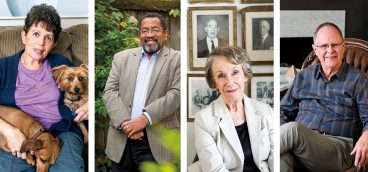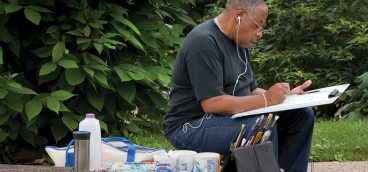
After 17 years as editorial assistant at the weekly Valley Mirror newspaper in Munhall, Marilyn Schiavoni’s boss informed her last year that he planned to retire and sell the newspaper. Marilyn was 62, and the prospect worried her.
Would the new owner let her keep her job? If yes, would she get along with the incoming crew? Would she get along with the new owner?
She considered retirement. A four-time cancer survivor, Schiavoni said her life had been fulfilling enough. She could see herself and her husband retiring to Florida, living a “Golden Age” life of leisure. But her finances urged her in a different direction. Her husband, Bob, had recently semi-retired. He earned less than half the salary he made most of his working life. That meant Marilyn would need an income and that a Golden Age retirement was unrealistic.
How would she structure her life in the face of these financial concerns?
The question is increasingly common among people approaching—or in the midst of—retirement age. A soon-to-be-published paper, “Transition to Retirement: Status, Trajectory, and Age Cohort Differences,” by Fengyan Tang, an assistant professor at the University of Pittsburgh’s School of Social Work, used data from the Bureau of Labor Statistics and survey results from the University of Michigan’s Health and Retirement Study to identify the work statuses of retirees and people entering retirement age. Retirement leisure is no longer the norm, according to Tang’s paper. Between 1977 and 2007, data showed that employment among people over 65 increased by more than 100 percent. That includes a 75 percent increase for men and a 147 percent increase for women. Of full-time workers who went through retirement-age job transitions between 2000 and 2008, more than half were either taking slow, gradual steps toward retirement or returning to work full time. This shows, Tang wrote, that potential cutbacks in Medicare, Medicaid and Social Security have encouraged many older Americans to choose a longer work life. “Even if people retire, sometimes they have to come back, to un-retire, to do something else,” Tang said in an interview.
Marilyn’s “something else” would not involve a new boss, she decided. In fact, her answer to financial uncertainty—and new changes in an old job—involved a giant leap of faith. She decided she wouldn’t wait for a new owner. She would make an offer to buy the Valley Mirror with her husband.
Of course, new entrepreneurial ventures aren’t right for everyone. For some, merely finding a job is work enough.
In response to the “Great Recession,” the Community College of Allegheny County instituted the Career Transition Center for Dislocated Workers. This non-age-specific program provides up to 36 credits of free tuition for laid-off workers in any 24-month period. CCAC expanded the program in July 2009 to target people over 50 in a partnership with MetLife and Civic Ventures, a Washington, D.C.-based think tank that studies Baby Boomers and runs a website, encore.org, for people entering second careers. The partnership funded a two-week course for medical office management and offered free tuition to people over 50, who had been laid off since January 2008.
Nancy Meyer was one of 34 people who graduated from the class before it ceased in January 2011 for lack of funding. The 56-year-old McKeesport resident had been laid off from her job as office assistant for an insurance agent. “Everyone said, ‘You gotta think about a career switch,’ ” Meyer said.
The CCAC class became more than a course in medical office management; it became a kind of group therapy session. “We felt hurt and abandoned,” she said. “When you’re over 50 and fired from a job you thought you did well, you feel like you’re adversely affected because of age. You feel like employers don’t want to pay you what you’re worth.”
The class offered a way to commiserate.
“Our instructor kept saying, ‘You will find work. Everything’s going to be OK.’ which was really great. When you’re in that situation, you start to think, ‘What’s wrong with me?’ You begin to doubt yourself. The classes gave us a chance to talk with people who were in the same spot we were.”
It took her until November 2010—eight months after her CCAC class ended—to find work. She turned down low-paying insurance jobs before becoming a customer service agent with AAA in East Liberty. It has nothing to do with medical office management, but she said it’s the best job she’s ever had. whether because of unexpected unemployment, conventional retirement or simply boredom, the question of what to do during later years is growing, as greater longevity and better health create new opportunities. The problem, however, is that “people don’t know what they want to be when they grow up,” said Karrie Valauri, project director for an AARP employment program in Pittsburgh. “People are deciding and sometimes being forced to start over again. We work them through that.”
AARP provides a free service at aarpworksearch.org to match open jobs with people approaching retirement age. The online questionnaire asks about skills and personal interests and provides links to jobs or classes.
Such free, self-guided programs, however, can be lonely and difficult. That’s why Neil Griebling, a Pittsburgh-based Zen Buddhist chaplain, founded Encores, a program he designed to “help people move into life’s second act.” Griebling’s hands-on service matches people with teams of local advisors, including financial planners and physical trainers. The program, which costs $600 a year for individuals and $900 for couples, begins with an eight-part test and a succession of meetings. The eventual goal is to have workshops and seminars and to provide new connections.
“We start by asking people about what they would do if they won a million dollars. We ask them to write their own eulogy and we talk about how they feel about it. People are increasingly anxious as they move toward retirement age. And because life is so virtual these days, increasingly people feel isolated. So one of the prime objectives is to create a sense of community, to get people out of the house and involved with people who can help them improve. Some people want to work during their retirement; some people want to volunteer. It’s really a matter of helping each individual do what they want to do.”
This often means pursuing activities that were difficult or impossible to do during full-time working years, said Shelli Sommariva, marketing communications manager at St. Barnabas Health System. Retired St. Barnabas residents are publishing novels after the age of 80, using their chemistry backgrounds to make award-winning wines, and creating custom art for local families. “Sometimes it’s just a matter of staying occupied,” she said.
Cassie Wolf is the life enrichment and events coordinator at Cumberland Woods Village in McCandless. The 30-year-old from North Huntingdon schedules entertainment for residents and often finds she has trouble keeping up with them.
“They’re very active with or without my help,” she said, laughing. Wolf is assisted in some ways by the facility’s numerous amenities, which include on-site restaurants, movie theaters and private rooms for parties and family gatherings. Those things help to keep people social—a simple but necessary element to any retirement experience. “If they don’t use it, they lose it, and that includes the mind, the body, everything. They can start to lose the ability to drive or even to communicate with friends. Keeping people social keeps them happier.”
And those psychosocial activities don’t need to be complicated, she said.
“Even the simplest things can keep their minds going. There are no cliff divers here or anything like that. We can’t cure Alzheimer’s or dementia. But something as simple as bingo can be a huge help just to keep people social.”
Still, event coordinators often do less to inspire goings-on than residents themselves.
“A truly great and lively retirement community is one where the residents drive the activities,” said Marilyn Walsh, director of marketing and public relations at Providence Point, a 32-acre facility overlooking the Chartiers Valley. She said most retirees choose communities because they’re just that—communities where people gather and have fun together.
“We just had a college football kickoff party, but residents put that together themselves,” she said. “They feel comfortable around one another. They want to interact. They want to be active.”
Many local retirement communities hire managers who organize events, parties and activities to help retirees remain active and involved. At Concordia Lutheran Ministries, Cathy Questiaux is director of the Haven retirement living program and responsible for organizing activities to keep retirees active. The Haven is a hands-off living facility for retirees in good health, and the average stay varies from five years to decades. Questiaux said that because there are so many interests and levels of ability, there are two philosophies that go into active living: Offering a large degree of choice and empowering residents to organize their own activities. Questiaux said 80 percent of the activities at the Haven are led by residents. “We’re trying to offer programs that will enhance their quality of life.”
Longwood at Oakmont has similar goals, according to Executive Director Michael K. Haye. Longwood offers a wellness program to keep people engaged and has a wellness coordinator on staff to keep Longwood accredited through the Commission on Accreditation of Rehabilitation Facilities, which sets standards for active programming in retirement communities. For physical wellness, Longwood features a certified trainer who structures strength and aerobic programs for the 65 and older population. “We want to give our residents a sense of accomplishment, strength, flexibility and balance,” Haye said. “Falls are a big issue so we want to help prevent falls as much as possible through training.”
For intellectual wellness, Longwood offers a New Horizons program, which features classes and speaker series and activities such as wine tasting. “An active life improves their lifespan. If they stay active, they’ll live longer by being more socially engaged.”
Socialization is the key, said Eric Gross, executive director of Masonic Village at Sewickley. “When people get to be 75 or 80, they may be less comfortable driving; they may not have a spouse. Depression and social isolation is a huge factor. When people move to a community like ours, if they aren’t busy and active, it’s their own darned fault. Kids will say that when Mom and Dad moved in, they never hear from them any more.”
There may be no better representative of active retirees than Mel Vesely, an 85-year-old World War II veteran and a retired Pittsburgh public school principal. This fall, the resident of Sherwood Oaks in Cranberry placed second in his age category (over 80) in the 10-kilometer Great Race in Pittsburgh. “If you’re bored, there’s something wrong,” he said, adding that Sherwood Oaks doesn’t have a professional activities director but that residents organize activities, events and groups to keep everyone busy.
“People need people,” he said. “So we do whatever we can to keep our social contacts alive.” He advised retirees who might be bored to think about interests they’ve always had that they might’ve forgotten during their work life. “What interests you besides the boob tube? Television is a wonderful thing, but as soon as someone turns it on, I go find a book to read or someone to talk with.”
For elderly folks not living in retirement communities, but still looking for people to interact with, one option is SCORE.
Many retired business people lend their expertise to aspiring entrepreneurs through this non-profit organization, once known as the Service Corps of Retired Executives.
SCORE volunteers typically donate 15-20 hours a month. “A lot of it is hand holding,” said SCORE’s Pittsburgh marketing director Stephen Cohen. “We can’t give legal advice, but we can give accounting and other kinds of advice. Often, though, it’s our job just to say if an idea has value or not. And if it does, then it’s our job to be encouraging, to say, ‘You can do this.’ ”
For entrepreneurs, contacting pittsburgh.score.org is a no-brainer, in Cohen’s view. It’s “free advice from people who have been successful in business their entire lives. How can you go wrong?”
And for retirees?
“You can only play golf for so long,” he said.
Marilyn Schiavoni doesn’t golf. But after she and her husband decided to make an offer to buy the Valley Mirror, Marilyn sought business advice through SCORE. She got in touch with retired Union Switch & Signal executive Bob DiRubbo, 62, of Forest Hills. DiRubbo perused Marilyn’s business plan and said it looked good.
“You’d think now would be the worst time to buy a newspaper,” he said. “But I thought it might work. It actually looked like they could make money.”
Marilyn and her husband made an offer in January 2010. Two days later, the paper’s former owner informed them that someone had exceeded their bid. They were disappointed but kept their spirits up. Two months later, the competing bid fell through. The Schiavonis took out a home equity loan and closed the deal in March 2010.
Within six months, they turned a profit. Ads were selling. She had a good relationship with her staff. And people in her community respected her moxie. But then Marilyn’s husband, Bob, who was 64, suffered a major heart attack and died in his sleep.
“Still, we had to come out with a paper that week,” she said. “It was horrible. But it taught me a lot about what this business is about.”
The newspaper became a way to stay active in her husband’s absence. “The paper became my lifeline,” she said.
As publisher, she now oversees a staff of five, including her son. They’re working on a new website and hoping to raise ad rates for the first time in a decade.
If anything, the rollercoaster ride of her last year has taught her some lessons about life and business. And for others who might face similar questions about finances and work in the run-up to retirement, she said it’s important to push your life in a direction that feels true and comfortable.
“You need to find something you enjoy. I would have never thought about taking this business over if I didn’t really love my job. Do I sometimes think about retiring to Florida or somewhere? Sure. But I like where I am. I’ve met wonderful people through the years and it’s been amazing. And I couldn’t imagine entering this part of my life without a smile on my face.”





